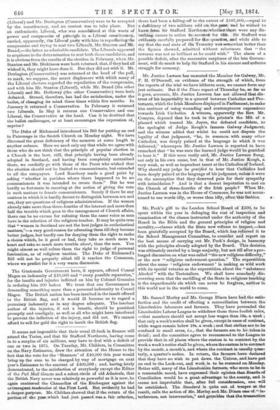The Duke of Richmond introduced his Bill for putting an
end to Patronage in the Scotch Church on Monday night. We have discussed the great deficiency of the measure at some length in another column. Here we need only say that while we agree with those who do not think that the principle of popular election in a Church is the best, still, that principle having been already adopted in Scotland, and having been completely naturalised there, we cordially go with those of the Peers who wished that the election should not be limited to communicants, but extended to all the ratepayers. Lord Rosebery made a good point by asking "whether in parishes where there happened to be no communicants it was intended to create them." But he was hardly so fortunate in sneering at the notion of giving the vote in such matters to female communicants. Surely if there be any matters in which it is hardly decent to distinguish between sex and sex, they are questions of religious administration. If the women already take more than three-fourths of the interest and more than half the trouble which goes to the management of Church affairs, there can be no excuse for refusing them the same voice as men have in the selection of the religious teacher. It may, be quite true that "women in Scotland are not the best judges in. ecclesiastical matters,"—a very good reason for educating them till they become better judges, but hardly one for denying them the right to make a choice which, be it good or bad, they take so much more to heart and take so much more trouble about, than the men. You might almost as well refuse them the right to judge of personal fascination, as of religious unction. The Duke of Richmond's Bill will not be properly sifted till it reaches the Commons, where we predict for it a very warm discussion.


































 Previous page
Previous page